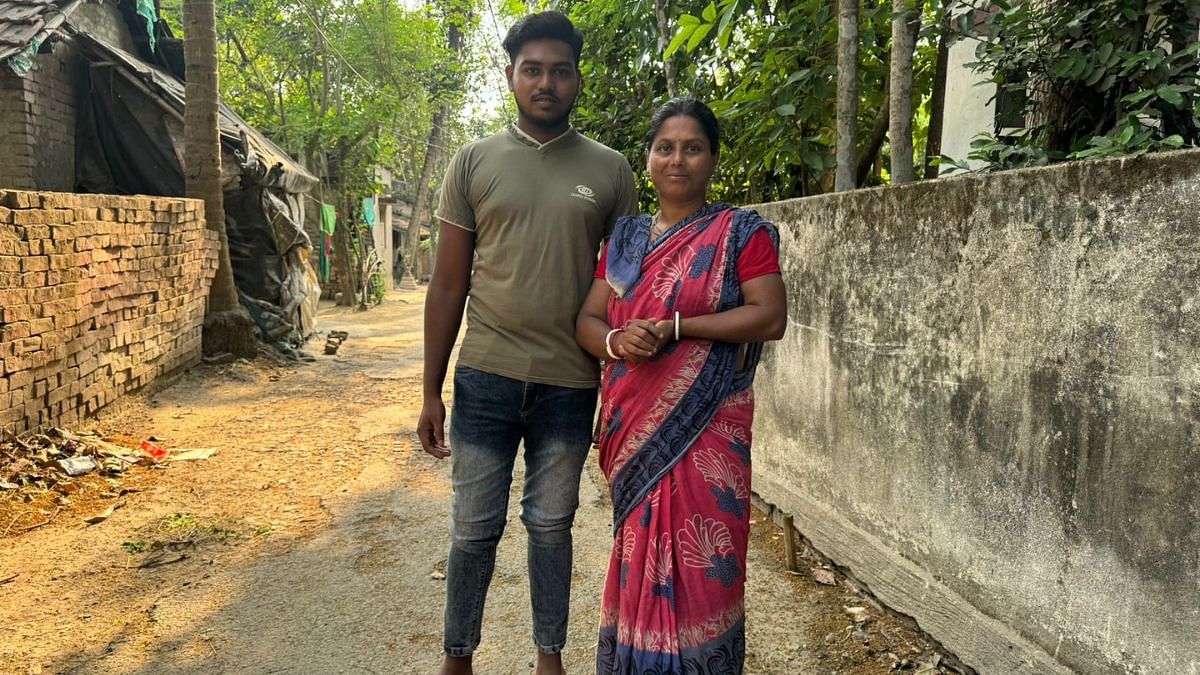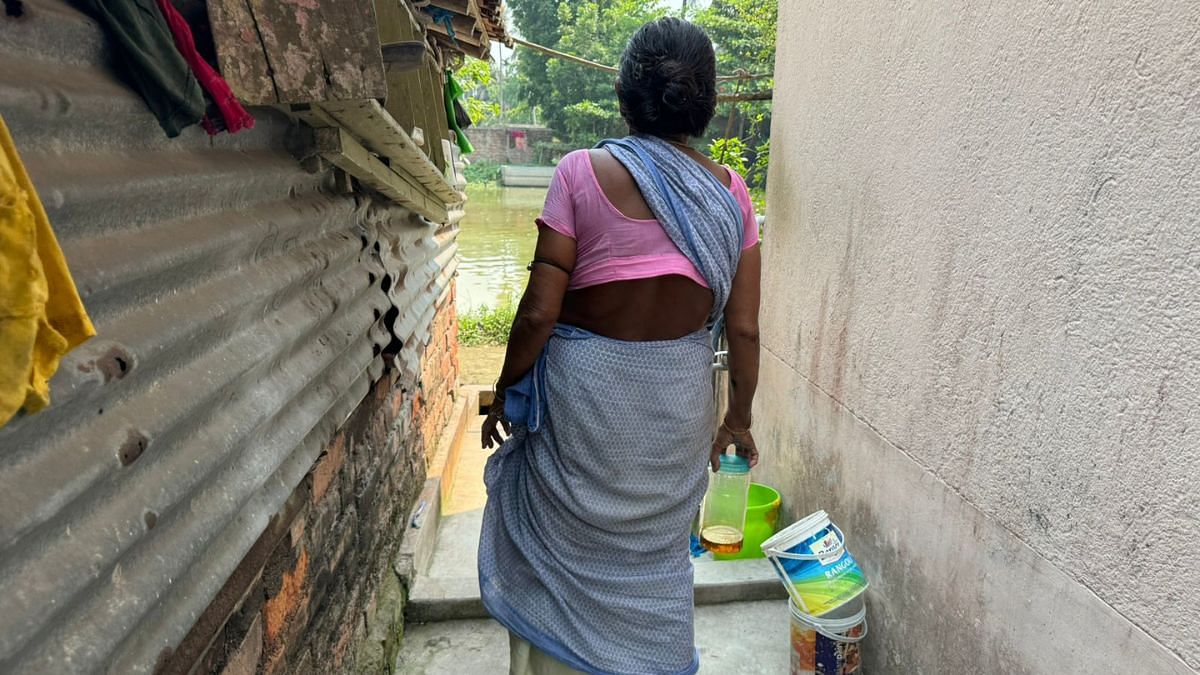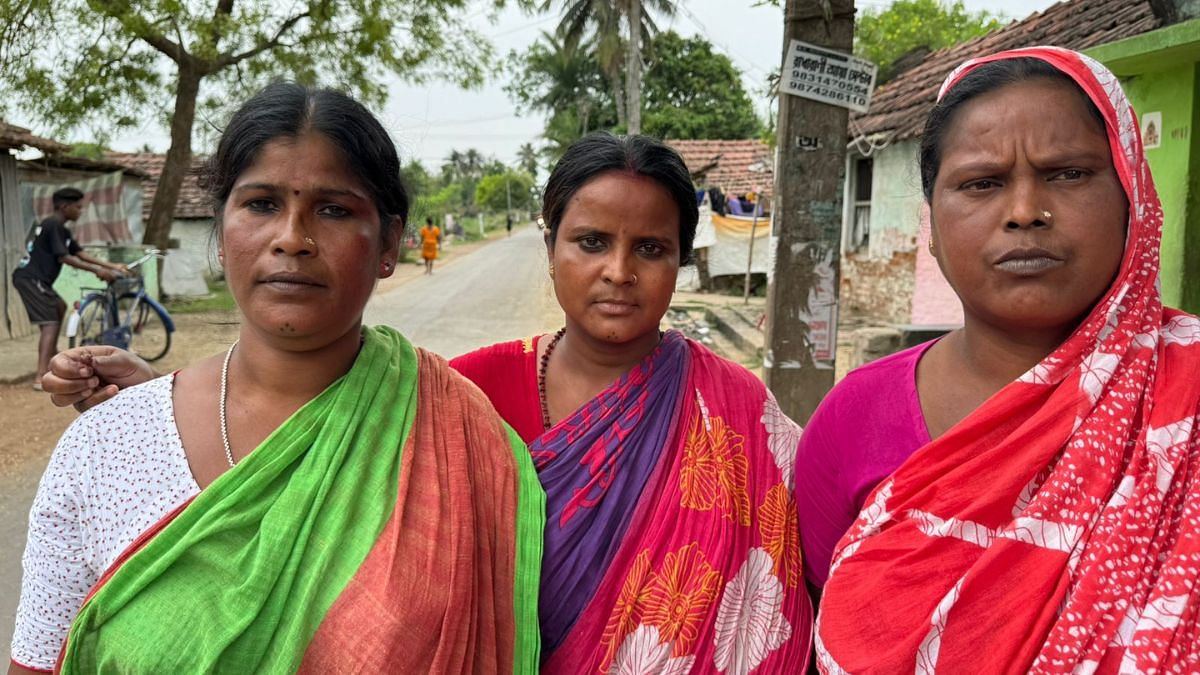Rupa’s husband, on the other hand, votes for the BJP. “My husband and I fight a lot. He keeps convincing me to vote for the BJP. But I say I will vote for the one who gives me money. I can’t do gaddari (betrayal),” she said, while on her way to the nearest Kali temple.
Despite BJP making ‘nari shakti (women’s power)’ its election plank in the state in the backdrop of the Sandeshkhali sexual harassment row, allegedly involving TMC leaders, Mamata Banerjee’s grip on the women electorate continues.
Since the TMC swept the 2011 assembly polls, it has counted on women as its core vote bank. BJP schemes such as Ujjwala and Pradhan Mantri Awas Yojana, it seems, have failed to make a dent in Mamata’s popularity.
Speaking to ThePrint, Rupa and other women from her locality said they have not benefitted from any central government scheme. “I know about Ujjwala but did not receive a cylinder because I was being asked to show too many documents, and I gave up. Water and latrines and monthly honorarium — everything Mamata gives us,” Rupa added.
Psephologist Biswanath Chakraborty said the BJP has failed to amplify its push for ‘nari shakti‘ on the ground in West Bengal, so only a few people know about it.
“People don’t know about Modi’s schemes and projects, while Mamata’s schemes are visible. In elections, people don’t care about politics; they get influenced by schemes. BJP does not have the same organisational support in West Bengal, especially in the Muslim-dominated belt, which is over 30 percent. They have failed to penetrate this one-third of the population,” said Chakraborty.
From Lakshmir Bhandar to Kanyashree — an annual scholarship scheme of Rs 750 for unmarried, school-going girls and a one-time grant of Rs 25,000 when they turn 18, and Rupashree — a one-time financial grant of Rs 25,000 for daughters’ marriage, and the monthly Rs 1,000 vidhwa bhata (pensions ), Mamata Banerjee’s gender-focused welfare schemes have won over a sizable chunk of the the state’s women.
Benefits of these schemes have reached households through TMC’s vast network of volunteers. Its beneficiaries — the women — said the financial support, though modest, has helped them contribute to household expenses and often to fulfil their personal needs.
Political analyst and former journalist Snigdhendu Bhattacharya said that TMC has always played politics along gender lines in West Bengal as they know women’s votes are crucial.
“How will you be able to unite Hindus when a part of their family (women) is with Mamata? BJP is highlighting Sandeshkhali so much because they are afraid that Mamata Banerjee’s popularity among women will spoil their chances on several seats,” he said.
Back in Barrackpore, Rupa checked her bag for her ATM card. She had to withdraw Rs 1,000 because her husband, who, running short on money, asked for Rs 300 from the Lakshmir Bhandar funds, which she kept aside as savings.
“See, now he wants Mamata didi’s money. I told him I will give him money on one promise — he will vote for TMC next time,” said Das, laughing out loud.
Also read: Khaki to politics — tale of 2 IPS officers set to fight for Mamata & Modi in Bengal
TMC goons don’t let us work: BJP
In Thuba Das Para under the Basirhat Lok Sabha constituency, Rekha Rishidas (51) said she used the Lakshmir Bhandar funds to support her son’s brief entrepreneurial stint of buying and selling guavas. He turned in a profit of Rs 900 on the first day, Rekha said.
“I am Scheduled Caste, so I got Rs 1,200 this month after the government hiked the funds. With this money, I have been able to help my son and daughter, and it has elevated my place within the family,” said Rekha.

Rekha also applied for the Ujjwala scheme benefit but didn’t get a cooking gas cylinder.
She is not the only one; several women across villages within the Basirhat constituency said they were unaware of central government schemes.
Suchitra Ghosh (59), who lost her husband six months ago, is now receiving the widow pension, along with the Lakshmir Bhandar money.
Ghosh said the funds have reduced her reliance on her son to pay for her medical expenses. “I buy my medicines myself and even buy things for my son,” she said, beaming with pride.

With 3.73 crore women voters in West Bengal, the bloc has become crucial for all political parties. The 2019 Lok Sabha elections witnessed a higher women voter turnout — 81.79 percent — compared to the 81.35 percent of men who turned out to vote.
The BJP, time and again, has accused the TMC of not implementing the central government schemes. In 2020, Prime Minister Narendra Modi alleged that Mamata was not implementing the schemes as they “don’t help syndicates” or “involve cut money”.
The TMC also stands accused of changing the names of central government schemes. For instance, Pradhan Mantri Gramin Awas Yojana has become Banglar Griha Prakalpa and Swachh Bharat Mission, Mission Nirmal Bangla.
BJP Yuva Morcha district vice president Subhankar Haldar accused the TMC of obstructing BJP volunteers, who he said were creating awareness about central government schemes.
“TMC goons are everywhere. They don’t let the BJP work. They are always up for violence. The TMC volunteers benefit from these (central) schemes. Go and see the houses of the small-time TMC volunteers; they are living in a bungalow,” he said.
Psephologist Chakraborty agreed, saying TMC workers obstruct BJP workers from creating awareness about central schemes but added that even BJP leaders in the state don’t know about them. “Ask a BJP president about the central government’s ten schemes, and they won’t be able to tell you,” he said.
State finance minister and president of TMC womens’ wing Chandrima Bhattacharya said Mamata knows the pulse of “mahila (women)”.
“What are women fighting for? Women want rights in politics and economy, and recognition. Our government is supporting them in this. We are not doing any favours. We are giving funds from the common people to ‘mahilas‘ so that we can strengthen them economically,” she said.
Also read: BJP shouldn’t fight BJP in West Bengal. And repeat 2021 mistakes in 2024
‘Making ends meet is our priority’
Since Momita Ghosh (31) first heard about the Sandeshkhali row on TV last month, she has been following the case by reading newspapers and watching TV. From her house in Tantra Purba Para, it takes her only an hour to reach Sandeshkhali, which has turned into a political hotbed ahead of the elections.
But, Momita said, the national media made it seem like “West Bengal women are in danger”, which, in her eyes, is not the case. She said in her locality, no one talks about the sexual harassment allegations, not because of fear but the “political edge” to it.
“Whatever happened with women in Sandeshkhali is wrong, but the incident has not garnered as much attention locally as it has nationally. We are aware how such incidents are made big ahead of elections,” Das said.
BJP’s Haldar, who has been campaigning door to door in Basirhat constituency, said his party is fighting against atrocities committed against women. “We are telling women they are being exploited. They should look at Sandeshkhali and reflect,” said Haldar.
Sources within the state BJP said that because the cadre base in Bengal is small, the party has been unable to spread its message effectively.
Sandeshkhali falls under the Basirhat Lok Sabha constituency, from which BJP has fielded a Scheduled Caste woman, Rekha Patra, who highlighted the plight of women in the Sandeshkhali case.
Considering its Muslim vote bank, the TMC has fielded a Muslim candidate for the seat.
While a section of the women in Basirhat identify with Rekha Patra, even they count themselves as beneficiaries of TMC’s schemes.
Asked about the possible impact of the Sandeshkhali incident, political analysts agreed that the BJP, for the first time, has tried their best to draw national media attention to a local-level incident and succeeded. “While it might not translate into votes, it can check more women from voting for the TMC,” said Chakraborty.
In Balagarh, under the Hooghly Lok Sabha constituency, Soma Hari (37) learned about the Sandeshkhali incident a week ago while washing dishes at her employer’s house.
A beneficiary of Mamata’s Lakshmir Bhandar, Soma said she doesn’t even know where Sandeshkhali is located.
“I know something has happened in Bengal, but I don’t know where Sandeshkhali is, and I have no time to read the news. Should I run my family or listen to political speeches on the incident?” asked Soma, with the women surrounding her nodding heads in agreement.
She added, “We belong to ‘sabse neecha jaati’. While we condemn the incident, Sandeshkhali is not our priority; making ends meet is.”
(Edited by Madhurita Goswami)
Also read: As Sandeshkhali’s women roar, why there’s barely a whimper from Bengal’s ‘educated elite’

